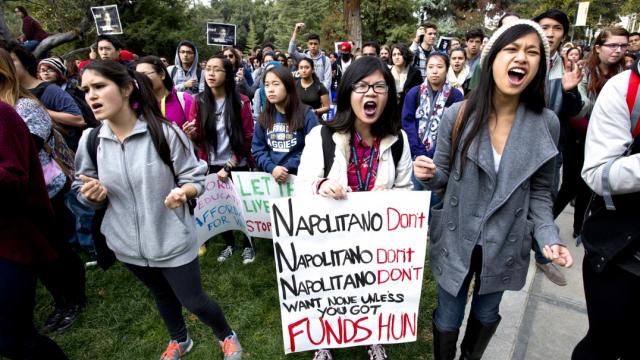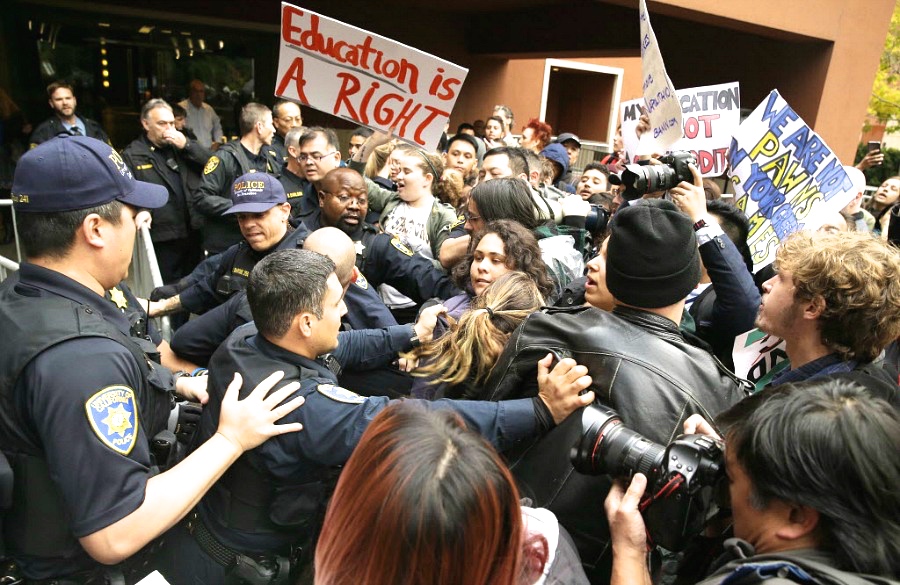
More than 500 students mobilized last week and took over the U.C. Davis administration building for about an hour to protest a proposed tuition hike by the Board of Regents.
The students chanted, marched and banged drums in Mrak Hall in what they said was a message to the Board.
"Tell them shame,” said U.C. Davis junior Mariah Watson. "Tell them that if you won't represent us we'll get rid of you. Raise tuition and we'll raise hell."
Students said they are frustrated over the proposed tuition hike that would raise their costs by more than $3,300 over the next five years.
That increase would make it tough for students like Lorena Castillo, a junior, to stay in school.
"Taking out all of these loans my parents cannot help me one bit, so they already told me if it gets any more expensive you might not be able to take out anything else and you might not be able to go to school," Castillo said.
Harley Litzelman, a sophomore, told KCRA 3 he'll be in San Francisco for Wednesday’s vote.
"We're going to be sending the message that students should not be used as political pawns in anyone's political game,” Litzelman said
U.C. President Janet Napolitano has proposed that a 5 percent tuition hike each year over the next five years is necessary to pay for rising pension costs, employee raises and to hire more faculty. The U.C. wants state taxpayers to kick in more money.
"It does not make sense that the state is not funding the university,” Chancellor Linda Katehi said. “So the students are very upset." Katehi agreed that part of the problem is pension related because the state stopped paying into the pension system "for 20 years."
"Pensions and health and salary increases are 6 percent of our operating budget and the state is not contributing to that,” said Katehi, who sounded sympathetic to the student cause.
"Well the students are protesting for a very good reason. Their education has not been funded," she said. "We have 2,000 students on this campus whose education has not been subsidized by the state."
As for the massive pension liability problem, Adele de la Torrre, U.C. Davis vice chancellor of student affairs told KCRA 3, "It does make it worse and I think this is another point that we're going to have to look at very carefully."
All this sets up a showdown in San Francisco on Wednesday for the much-anticipated vote.
Brown has already indicated he'll be voting “No,” and just named two new appointees to the Board of Regents to help hold the line on tuition.
Tuesday’s rally and march came three years to the day that pepper spray was used on protesters who gathered in the campuses quad during an Occupy movement. The 2011 pepper-spray incident led to a class-action lawsuit against the University of California.
Meanwhile, Alexander Barreira and Heyun Jeong report for The Daily Californian that the occupation was ongoing late last week:
Fighting against tuition increases and, at times, their own exhaustion, students and community activists continued to occupy Wheeler Hall and protest throughout campus Thursday.
The occupation began Wednesday evening after a vote by the U.C. Board of Regents to move forward with a proposed tuition hike policy, which was officially approved Thursday morning. Berkeley students voted to occupy the building as well as conduct a walkout Monday.
As of 11 p.m. Thursday, more than 300 individuals remained in the building.
The lobby of Wheeler Hall remained crowded with about 50 to more than 100 people at different times throughout the day. Protesters bound shut some doors to the building but left some open for students, who weren’t prevented from attending class by the “open university” protest.
The campus has not taken action to evict the protesters. The relationship between police and protesters at the occupation has been relatively free of conflict, students say.
“This is between the students and the administration,” said UCPD Officer Marco Ruiz. “If there’s a life threatened or hazardous conduct, (we’ll intervene). But short of that, we’ll let students do their thing.”
U.C. Berkeley spokesperson Janet Gilmore said in an email the campus would continue to monitor and assess the situation as it unfolds.
Students and community activists say they intend to stay in the building until their demands are met, which include an end to tuition hikes, greater transparency of the state budget and for authorities to not pursue charges against Berkeley student Jeff Noven, who was arrested Wednesday outside the regents meeting and later released.
“People who are easy to step over are stepped over,” said Daniel Evans, a Berkeley freshman who attended the occupation. “If this works, this shows our Berkeley ethos — that student protests are not something to roll your eyes at.”
In the afternoon, students submitted and voted on proposals during a general assembly meeting to decide the protest’s next moves, leading to the adoption of a nighttime “dorm storm” march to draw more students to the occupation of Wheeler Hall. A group of about 100 students walked to the courtyards at Units 1, 2 and 3 before heading to residence halls Bowles and Foothill, chanting “This is what democracy looks like” and “We’re not gonna take it.”
Throughout the day, protesters stood outside Wheeler Hall with megaphones and banners, inviting students to join the cause.
“There’s not a lot you can do as a full-time student. We don’t always have the time to draft proposals or go to UCSF,” said Ramsey Karim, a Berkeley sophomore who joined the occupation. “But if I can sit here and do homework and make the protest look more impressive, I sure will, because I support it.”
Earlier in the afternoon, protesters entered Wheeler Auditorium during a lecture by campus lecturer Khalid Kadir. Kadir, who was speaking about social movements throughout the world, gave the stage to protesters for brief announcements. Some protesters disapproved of the decision to interrupt the class, saying it would interfere with the goal of the protest.
Student regent Sadia Saifuddin, a Berkeley alumna who voted against the tuition hikes, and state Assemblymember-elect Tony Thurmond came to Wheeler Hall on Thursday evening to speak alongside ASUC External Affairs Vice President Caitlin Quinn and Mon-Shane Chou, the ASUC academic affairs vice president.
They were scheduled to speak at Unit 2 during a town hall, but according to Ellen Topp, director of communications of student affairs, the reservation was cancelled because the scheduled room was not large enough to accommodate the expected number of attendees.
Saifuddin called the tuition hike situation a “power struggle between the state and governor … (both of which) have taken the students as a pawn.” She said that the regents have no idea what the student experience is like and acknowledged that it was hardest for the students in the middle class, who may not receive financial aid.
“We have to turn up the pressure on both entities,” she said. “If we work really, really hard, we may get our funding.”
Chou expressed frustration at the privatization of the university, as evidenced by the “ridiculous philanthropy posters everywhere,” and said the campus was dependent on donors. She pointed out that revenue from the tuition hikes would go to admitting more students, leading to what she considered an endless cycle of raising the fees necessary to provide resources for more students.
The protesters said they will hold a general assembly in Wheeler Hall on Friday to discuss action proposals.
Student protesters are also planning to share a potluck dinner later Tuesday evening.
3 WAYS TO SHOW YOUR SUPPORT
- Log in to post comments
















